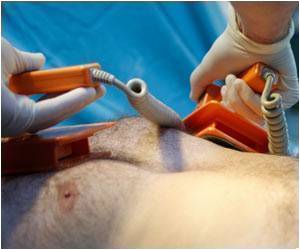Women receive greater benefit from cardiac resynchronization therapy with defibrillator (CRT-D) than men, says study.

Historically, heart disease has been dominated by its association with men. But, thanks to successful awareness campaigns in recent years, such as the American Heart Association's Go Red for Women initiative, women have started to take note of their risks and take action to protect their health.
On all fronts, women receiving CRT-D therapy to prevent heart failure progression had significantly better outcomes than men receiving the therapy. Reduction of heart failure in females was twice that of males - 70 percent versus 35 percent.
In women with mild heart failure, CRT-D therapy effectively prevented deterioration of the heart, otherwise known as cardiac remodeling, by preventing enlargement of the heart with more effective contraction of the heart.
Study authors investigated the reasons for the significantly better result in women than men. Women in the study were more likely to have non-ischemic heart disease, a disorder typically characterized by inflammatory scarring of the heart muscle, while men had a greater likelihood of ischemic heart disease - otherwise known as coronary artery disease - where narrowed arteries restrict the flow of blood and oxygen to the heart. Additionally, more women had left bundle branch block, a condition that results in disorganized electrical activity throughout the heart.
Because left bundle branch block and non-ischemic heart disease lead to diffuse, as opposed to localized, heart problems, study authors reasoned women were more responsive to CRT-D therapy, a treatment that strengthens the overall mechanical pumping action of the heart and coordinates the heart's electrical activity.
Advertisement
CRT-D therapy combines an implantable cardioverter defibrillator (ICD), which is designed to prevent sudden, rhythm-related cardiac death, with cardiac resynchronization therapy (CRT), which improves heart function with a reduction in heart failure and associated symptoms.
Advertisement
Source-ANI













